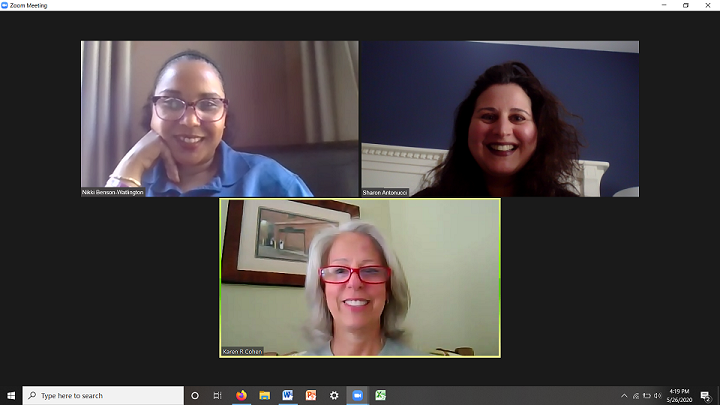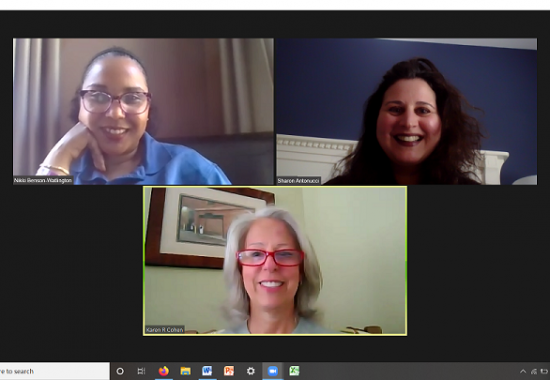
Aphasia impacts more than two million people in the U.S. alone. During National Aphasia Awareness month, MRRI is pleased to highlight the outstanding scientists, clinicians, and staff of the MossRehab Aphasia Center. The Center brings together leading researchers and expert clinicians within the region’s only top 10 U.S. rehabilitation hospital to address the long-term communication and psychosocial needs of individuals with aphasia. Through our Center, we provide individuals with aphasia and their co-survivors with resources, support, treatment, and opportunities to participate in research.
In collaboration with community members with aphasia and their families, Myrna Schwartz, PhD, and Ruth Fink, MA, CCC-SLP, founded the Center in recognition of the fact that lifelong recovery is possible and that social rehabilitation is a crucial part of that process. Opened in 1996, it was the second aphasia center in the U.S. and the third in North America. Through the Advanced Clinical Therapy Program, the Activities Center, and ongoing innovation in research, the MossRehab Aphasia Center provides a spectrum of services in a supportive and inclusive environment.
The Constance Sheerr-Kittner Conversation Cafés are a cornerstone of our Center’s programming. A small, but growing, evidence base indicates that those with aphasia who participate in conversation groups experience increases in both functional communication effectiveness and psychosocial wellbeing or quality of life. Funded by an Albert Einstein Society Research Grant, a longitudinal pilot study examining these outcomes with new Conversation Café members is in the final stages of data collection. During weekly Conversation Cafés, people with aphasia engage in sharing stories, daily experiences, and topical discussions and debates. These meetings are facilitated by a speech-language pathologist and provide an environment conducive to practicing communication strategies. Most importantly, Conversation Café participants have the opportunity to develop friendships that extend beyond the physical boundaries of the Center.
Maintaining these relationships is even more critical in the face of the COVID-19 quarantine, which can only serve to exacerbate the social isolation experienced by many people with aphasia. In recognition of the need to continue providing this critical support, even from a distance, the Center has transitioned to virtual group meetings. Under the auspices of the United States Department of Health and Human Services guidelines for telehealth during COVID-19, MossRehab Aphasia Center speech-language pathologist, Karen R. Cohen, MSPA, CCC-SLP, facilitates virtual conversation groups five times weekly, as well as a virtual Talking Book Club, providing a venue for members to continue socializing, share their experiences, and receive essential language and communication practice. In collaboration with Center director, Sharon M. Antonucci, PhD, CCC-SLP, our Outreach Administrative Coordinator / Member Liaison Nikki Benson-Watlington has created aphasia-friendly pictorial guides demonstrating how to download and access the virtual platform as well as suggestions for maintaining security online. Ms. Benson-Watlington reached out to every member individually to confirm they were able to access the technology and to walk them through any necessary problem-solving.
Feedback thus far demonstrates the importance of keeping these connections strong.
“Thanks so much for this morning. I think the Zoom went very well and although [he] doesn’t talk too much; I know he is really delighted to see everyone. Please stay well.” – MossRehab Aphasia Center Co-survivor
“Wow. Today was great! [He] had a real nice time. And, as always, I enjoyed it too.” – MossRehab Aphasia Center Co-survivor
“This is just outstanding. I love that we can do this. You have no idea what this means to him, and us, really…” – MossRehab Aphasia Center Co-survivor
The MossRehab Aphasia Center team is dedicated to embracing technology to address the needs of our community and deliver innovative programs to people with aphasia. These statements from co-survivors are a testament to the impacts that resources and support from our Center are providing participants during this difficult time. Having been in the vanguard of Aphasia Center programming, the MossRehab Aphasia Center continues to provide outreach, advocacy, and education, advancing knowledge and putting that knowledge into action every day for people with aphasia, their families, and the broader community.


73 comment on “Spotlight on the Constance Sheerr Kittner Conversation Cafés at the MossRehab Aphasia Center”